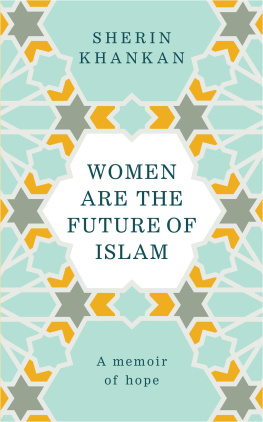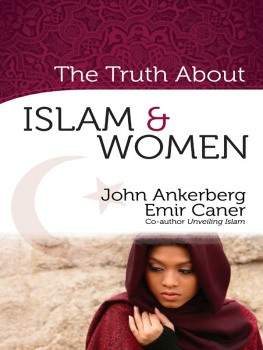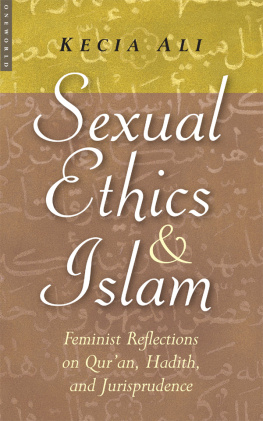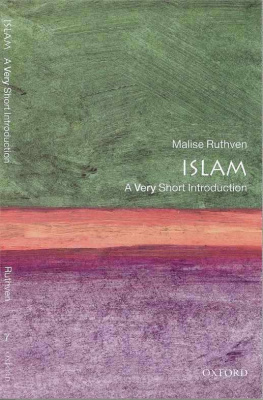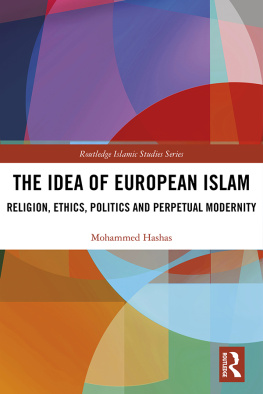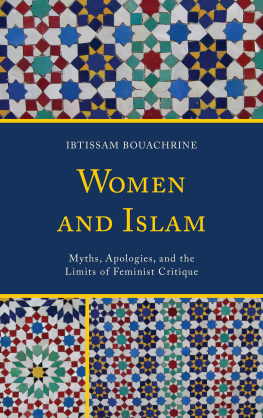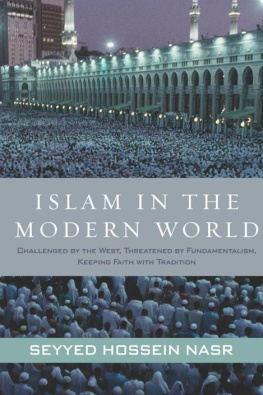Contents
About the Book
A remarkable woman challenges the idea that Islam should be defined by masculinity and conservatism.
Named one of the BBCs 100 Women of 2016, and the subject of a Guardian interview, Sherin Khankan is one of the very few female imams in the Western World. In addition she has founded the first mosque for women in Europe.
In her revelatory book, she addresses such issues as the place for modern women in Islam, fundamentalism, radical Islamic groups, Islamic divorce, Sufismand she also describes her own personal journey as a female Muslim activist.
Women Are The Future of Islam shines a feminist light on a gentler, more inclusive, more liberal but also fully engaged side of Islam that we rarely see in the West. Its an eye-opening, highly topical read.
About the Author
Sherin Khankan founded the first mosque for women in Europe and is one of the very few female imams in the world.
Awarded an MA in the Sociology of Religion and Philosophy from the University of Copenhagen, she is a lecturer, published author, columnist, activist, and former television commentator on religion and society. In addition she is an expert in contemporary Islamic activism and Sufism in the Middle East.
In August 2001 she founded the Association of Critical Muslims and, in 2014, the Exit Circle, Denmarks first self-help group against psychological abuse. In 2016 she founded the Mariam Mosque in Copenhagen, as well as Femimam, an international group of female and male scholars who advocate for the need for female imams. Also in 2016, she was chosen as one of the BBCs 100 Women, representing the worlds most pioneering women.
Sherin has a Syrian father and a Finnish mother. She spent a year in Damascus before the war, studying Islam. Today she lives in Copenhagen and is the mother of four children.
I pray for family stability (earth), emotional clarity (water) and the courage to transform (fire) and burn up that which no longer serves love, in order that something new can grow and find a higher perspective (air).
To my four children, my teachers: may you find balance Aisha (air), Salaheddin (water), Djibril (fire) and Halima (earth).
And to the future generation of young Muslims, the secure, the homeless and the refugees.
To the loud and silent revolutions, the open and the hidden.
Introduction
I FIND IT important to transform knowledge into activism. As a sociologist of religion and philosophy, and a practising Muslim, I can offer new perspectives on Islam in the West. This book is written from an activists point of view and should be read as the individual story of a female Muslim activist in Europe. It is about my personal journey leading up to the establishment of the first mosque in Scandinavia with female imams and is for everyone who has an interest in Islam in the West and Islamic feminism. It does not represent a definitive text or absolutist view of Islam in Europe. I have found my place in the loneliness that comes from not being a member of the established consensus.
It is my hope that this book can challenge patriarchal structures and readings of Islam, and the spread of Islamophobia, give new insight into contemporary female Islamic activism in the West and above all inspire a new generation of Muslim women to become activists and open up new mosques with female imams in other places around the world.
CHAPTER ONE
The making of Mariam Mosque
People go on claiming that something is impossible until someone comes along and just does it.
Halima Krausen, Muslim theologian and imam in Hamburg, Germany
At the wheel of a borrowed car, Saliha and I head towards Copenhagen with the certainty that we are driving into history. In less than three hours, on this Friday, 26 August 2016, we will officially become the first female imams in Scandinavia. The title imam is among the most notorious and disliked in Denmark due to the growing Islamophobia in the world. Saliha, a Danish convert and Arabic expert with a masters degree in Middle Eastern studies, and I have discussed the meaning of imam many times since we first met and started our feminist movement. It is a controversial title, one that, to this day in Scandinavia and most places in the world, belongs exclusively to men. As we drive into the city centre, we play with words and both realise that, within an hour, imam will transform into an imamah. Saliha rejects the title imamah for herself and prefers the term khatibah (a woman who delivers the sermon). I hesitate as well. But in that very moment, realising that I am about to lead the Friday prayer, I decide to embrace the title of imamah with more confidence than ever before. It is a title that conveys a variety of meanings and practices, and can be defined as one who leads prayer, one who leads the mosque or one who offers Islamic spiritual care.
Now things are becoming real. Soon, when I recite the call to prayer, the first mosque for women in Scandinavia will be officially established. To be sure, its an important event for Denmark, my native country, which consists of an archipelago and a peninsula tied to Germany that rises up like a ships mast between the North Sea and the Baltic Sea. For six months, the opening of Mariam Mosque has been the subject of much discussion. However, we decided from the beginning to keep a low profile. In order to preserve the spiritual atmosphere, no media personnel were allowed inside the mosque. Only a few select female journalists, including a reporter from the Guardian, were allowed to participate in the prayer rituals, and then without cameras. The journalist from the Guardian then published an article online based on her experience. Little did we know that, soon afterwards, news of our mosque would spread worldwide, from Copenhagen to China. On the verge of becoming a female imam, my life is at a turning point.
Last night was a short one. Yesterday evening, all the members of the Femimam group, including me, were working at the mosque late into the night in order to have it ready for the opening. These things are always last minute. Saliha and I were on the late-night news. When we got back late to my seventeenth-century house in the countryside of Dragr, a historic fishing town over nine miles from the capital, neither of us could get to sleep until three in the morning. Its a good thing adrenaline cancels out fatigue, because as we drive towards Copenhagen and the rural landscape gives way to the first brick buildings of the suburbs, I recite the adhan, the lyrical call to prayer that penetrates the hearts of every Muslim to the point of becoming part of his or her being. I also recall the main points of my welcoming speech.
And suddenly were in the city centre, driving along the canals, right by Borgen, the seat of the Danish parliament, known around the world from the eponymous television series. Mariam Mosque (named in homage to Mariam or Mary, the mother of religions, who unites and protects where there is no hope or light, has a sura, or chapter, of the Quran named after her, and is viewed by some Muslims as a female prophetic figure) is not far from here, at the heart of the touristy area, along a commercial pedestrian street where all the big fashion brands have stores: H&M, Malene Birger, Tiger of Sweden, etc. From the road, you wouldnt notice anything: the prayer room is on the first floor above street level, in a discreet building above a fast-food restaurant.

